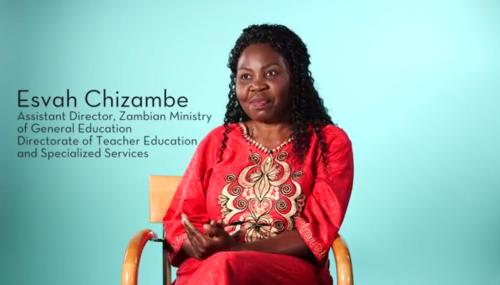On Thursday, October 27, the Center for Universal Education (CUE) at Brookings and the U.K. Department for International Development (DFID) co-hosted an event, “Ensuring millions of children have the opportunity to learn,” in London to share findings and recommendations from the report, Millions Learning: Scaling up quality education in developing countries.
Anna French, education policy team head of DFID’s Youth and Education Department, opened the event with introductory remarks and Jenny Perlman Robinson, fellow at CUE, presented on the Millions Learning report. Perlman Robinson then moderated a panel that included Lucy Lake, chief executive officer of Camfed International; Lord Jim Knight, chief education adviser at TES Global Limited; and Deema Bibi, chief executive officer of INJAZ to discuss the Millions Learning report’s findings in the context of the panelists’ experiences.
Below are some of the panelists’ responses.
Jenny Perlman Robinson: One of the core ingredients in the Millions Learning report is designing education interventions based on local education demand. An important strategy for ensuring this is improved accountability between education providers and their clients. In what ways has Camfed International approached accountability to its “clients,” or girls?
Lucy Lake: Camfed’s underpinning principle is accountability to the girl—to each individual girl. The systems and processes we’ve created are all designed to enforce that accountability. Camfed scaled up very dramatically from supporting tens of thousands of marginalized girls to supporting hundreds of thousands of girls to go to secondary school, within the space of just a few months. And it was not just the scale-up in numbers that we achieved but the improvement in girls’ learning outcomes. When programs go to scale, this often leads to the exclusion of the most marginalized, because it requires a highly contextualized approach to ensure that the most marginalized children are in school and learning, recognizing that the barriers to their education go well beyond the school gates. So our challenge became how to deliver a highly contextualized, community-led approach to scale, in tandem with government school systems. The critical success factor was our governance model—governance at every level and in relation to three core areas: finance, data, and partnerships.
Jenny Perlman Robinson: Another key finding in the Millions Learning report is this notion that context-appropriate technologies can accelerate education progress. Based on your experiences at TES Limited, what role do you see technology playing in scaling up quality learning opportunities and reaching more children—today and in the future?
Lord Jim Knight: Technology has been effective in schools by making administration more efficient and, where implemented well, by saving teachers time outside of the classroom. The disappointment is in the enhancement of teaching and learning by technology. In simple terms, I think that this is explained by too much product development being led by the technology rather than the teaching. At tes.com, we have built a hugely popular resources bank for teachers by accident! We built something simple to respond to demands from our teacher users to be able to easily share stuff with each other. Now, teachers keep coming back because the content all comes from teachers. In the future, I would expect to see a shift from technology for efficiency to technology for teaching. In many countries, children are growing up with smartphones and tablets, and this will only increase as technology becomes more embedded in their home lives. We need to smooth the experience of informal learning out of school with the reality of formal learning in school if we want to keep young people engaged with school based learning. I also anticipate more use of artificial intelligence in schools. If leaders believe that there is one standard way to teach standard subjects so that pupils pass standardized tests, then they may as well use robots following algorithms over teachers following manuals. However, I think that instead, we will want to trust teacher professionalism. Teachers can then individualize the learning informed by data-driven artificial intelligence. This may also help us raise the quality and productivity of teachers, as we face predictions of a shortfall of 26 million primary teachers globally by 2030. Making space for teachers is certainly our focus at tes.com, and I hope others will do the same.
Jenny Perlman Robinson: The Millions Learning report finds that an enabling environment is an essential element for scaling quality education. In the context of Jordan, what are some of the core factors behind the government creating an enabling environment and mainstreaming INJAZ’s Financial Education Program (FEP) across Jordanian schools?
Deema Bibi: At INJAZ, we believe that financial literacy is the first step towards achieving financial inclusion and empowerment and that mainstreaming financial literacy in school curricula is one of the most effective ways to reach young people. An exciting milestone occurred in March 2015, whereby the Central Bank of Jordan, the Ministry of Education, and INJAZ agreed to jumpstart financial education in Jordan on a national scale. As a result, the FEP is now being mainstreamed as a core subject for grades 7-12 in all public, private, military, and United Nations Relief and Works Agency for Palestine Refugees in the Near East (UNRWA) schools across Jordan.
I think a key reason that this initiative has been possible is because of INJAZ’s multi-stakeholder approach, which demonstrates a clear public private civil society model that is led by the government—across institutions—and actively engages civil society and the private sector to work together to achieve clear goals. Additionally, the role of the private sector was crucial as it is a key source of relevant knowledge and skills, in addition to being a main source of funding for the initiative. The private-public partnership model was reflected and adopted in every phase and element of the program.
The Millions Learning event concluded with closing remarks from Beau Crowder, education advisor at the Vitol Foundation, who underscored the importance of collective action in accelerating progress toward reaching more children and youth around the world.
As a follow up to the Millions Learning launch in the U.K., the CUE will launch the report in Brazil on Monday, November 28, and in Jordan on Monday, December 5. Please get in touch if you have ideas for future report dissemination opportunities.





Commentary
Ensuring millions of children have the opportunity to learn
November 22, 2016